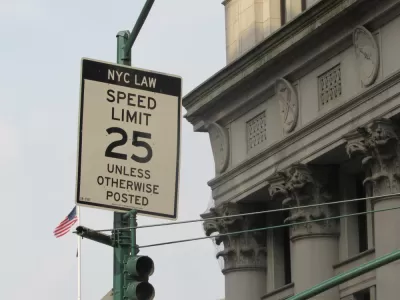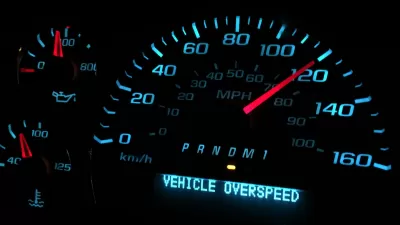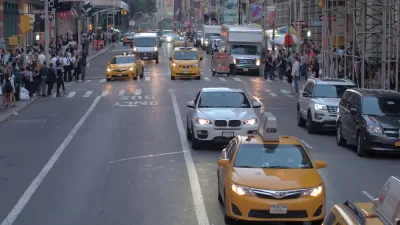Advocates hope the city’s plan to install speed governors on part of its municipal fleet will prompt other cities and government agencies to follow suit.

Because regulating the design of cars and trucks is the purview of the National Highway Traffic Safety Administration (NHTSA), local and state governments in the United States don’t have the power to require safety features not included in federal law. But as David Zipper writes for Bloomberg CityLab, “an intriguing move in New York City suggests a possible workaround: Even if cities and states can’t regulate motor vehicle design, they still wield power over their own sizable fleets.”
A pilot program announced by New York City Mayor Eric Adams last week will install speed governors on 50 city-owned cars. As Zipper explains, “intelligent speed assistance (ISA) uses geolocation to adjust the allowable speed as the posted speed limit changes during a journey. If a driver hits the maximum threshold, the ISA system applies resistance to the accelerator and makes it more difficult (if not impossible) to go faster.”
The program, if expanded to more vehicles, could bring an added benefit by setting the tone for other drivers. “A handful of vehicles driving at the speed limit can force those behind them to follow suit, amplifying safety benefits.”
The article quotes National Transportation Safety Board Chair Jennifer Homendy, who is supportive of cities making similar efforts to install ISA in municipal fleets. “I think it would move the ball forward to get this technology in the market,” Homendy said, which could encourage automakers to make the feature available on more vehicles. As Zipper concludes, “As with seatbelts, airbags and other once-controversial safety advances, driver familiarity could make it easier for Congress and NHTSA to make them mandatory, as Europe has.”
FULL STORY: Why New York City’s Car Safety Pilot Is a Big Deal

Planetizen Federal Action Tracker
A weekly monitor of how Trump’s orders and actions are impacting planners and planning in America.

Map: Where Senate Republicans Want to Sell Your Public Lands
For public land advocates, the Senate Republicans’ proposal to sell millions of acres of public land in the West is “the biggest fight of their careers.”

Restaurant Patios Were a Pandemic Win — Why Were They so Hard to Keep?
Social distancing requirements and changes in travel patterns prompted cities to pilot new uses for street and sidewalk space. Then it got complicated.

Platform Pilsner: Vancouver Transit Agency Releases... a Beer?
TransLink will receive a portion of every sale of the four-pack.

Toronto Weighs Cheaper Transit, Parking Hikes for Major Events
Special event rates would take effect during large festivals, sports games and concerts to ‘discourage driving, manage congestion and free up space for transit.”

Berlin to Consider Car-Free Zone Larger Than Manhattan
The area bound by the 22-mile Ringbahn would still allow 12 uses of a private automobile per year per person, and several other exemptions.
Urban Design for Planners 1: Software Tools
This six-course series explores essential urban design concepts using open source software and equips planners with the tools they need to participate fully in the urban design process.
Planning for Universal Design
Learn the tools for implementing Universal Design in planning regulations.
Heyer Gruel & Associates PA
JM Goldson LLC
Custer County Colorado
City of Camden Redevelopment Agency
City of Astoria
Transportation Research & Education Center (TREC) at Portland State University
Camden Redevelopment Agency
City of Claremont
Municipality of Princeton (NJ)





























